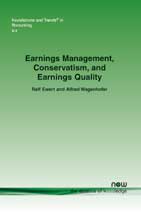Earnings Management, Conservatism, and Earnings Quality
By Ralf Ewert, University of Graz, Austria, ralf.ewert@uni-graz.at | Alfred Wagenhofer, University of Graz, Austria, alfred.wagenhofer@uni-graz.at
Abstract
This monograph reviews economic models that study earnings management and conservatism in an information economics framework. Both introduce a deliberate or a mandatory bias in financial reports. The fundamental issue this monograph addresses is what economic effects these biases have on earnings quality. We focus on models of managers in firms interacting with rational capital market participants, and briefly consider some contracting models. The models allow us to analyze earnings management and rational inferences by market participants in equilibrium in a variety of settings and to pinpoint costs and benefits of earnings management. We discuss how investors can elicit the maximum information from the biased reports and what potential remedies actually achieve in equilibrium. For example, accounting standards that reduce discretion for earnings management may be detrimental from a welfare point of view. In rational expectations models earnings quality can be defined as the information content in reported earnings. We discuss the earnings response coefficient, value relevance, and accounting-based earnings quality measures and how they reflect changes in earnings quality. Further, we review analytical work on conservatism of accounting standards and why conservatism can be welfare-enhancing even though it introduces a bias in the earnings reports. It is exactly through this bias that the benefit arises. Therefore, a differentiated view of earnings management and conservatism is warranted; neither is principally desirable or undesirable, but this depends on the circumstances. The benefit of equilibrium models is that they offer a rigorous explanation for the phenomena and show that sometimes conventional wisdom does not apply. There exist subtle interactions between accounting standards, the institutional environment, and earnings management that lead to several insights that challenge conventional wisdom. The models describe the economics behind these results and the particular circumstances.
Earnings Management, Conservatism, and Earnings Quality
Earnings Management, Conservatism, and Earnings Quality reviews and illustrates earnings management, conservatism, and their effects on earnings quality in an economic modeling framework. Both earnings management and conservative accounting introduce biases to financial reports. The fundamental issue addressed is what economic effects these biases have on earnings quality or financial reporting quality.
Earnings Management, Conservatism, and Earnings Quality reviews analytical models of earnings management and conservatism and shows that both can have beneficial or detrimental economic effects, so a differentiated view is appropriate. Earnings management can provide additional information via the financial reporting communication channel, but it can also be used to misrepresent the firm's position. What the authors find is that similar to earnings management, conservatism can reduce the information content of financial reports if it suppresses relevant information, but it can be a desirable feature that improves economic efficiency. The approach to study earnings management, conservatism, and earnings quality is based on the information economics literature. A variety of analytical models are reviewed that capture the effects and subtle interactions of managers' incentives and rational expectations of users. The benefit of analytical models is to make precise these, often highly complex, strategic effects. They offer a rigorous explanation for the phenomena and show that sometimes conventional wisdom does not apply.
The monograph is organized around a few basic model settings, which are presented in simple versions first and then in extensions to elicit the main insights most clearly. Chapter 2 presents the basic rational expectations equilibrium model with earnings management and rational inferences by the capital market. Chapter 3 is devoted to earnings quality and earnings quality metrics used in many studies. Chapter 4 studies conservatism in accounting. Finally, the authors examine the interaction between conservatism and earnings management. Each chapter ends with a section containing a summary of the main findings and conclusions.
